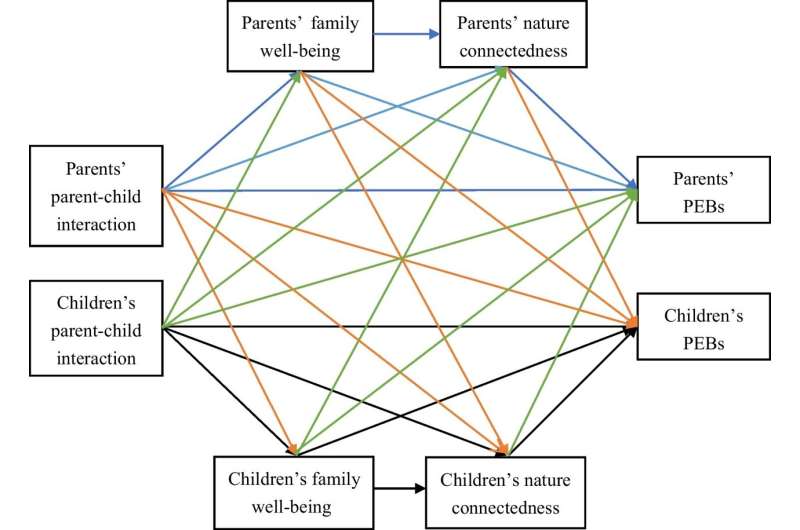Parent鈥揷hild interaction found to promote pro-environmental behavior through family well-being, nature connectedness

The deterioration of global ecosystems and environmental problems, such as global climate warming, extreme weather events, and severe pollution threaten the human environment. Implementing pro-environmental behaviors is one of the effective ways to solve environmental problems. How to promote behavioral change and implement more pro-environmental behaviors through family education has become a social research focus.
In order to explore family-based strategies to effectively promote pro-environmental behavior, a research team led by Dr. Liu Pingping from the Institute of Psychology of the Chinese Academy of Sciences conducted an empirical study on children (11鈥�14 years old) and their families (416 pairs of valid data on parents and children).
They revealed a positive impact of parent鈥揷hild interaction on pro-environmental behavior, and also the potential impact mechanism of family well-being and natural connectedness based on the actor鈥損artner interdependence mediation model.
This study was in Current Psychology on Jan. 9.
The researchers found that parent鈥揷hild interaction has a positive impact on intergenerational relationships and family well-being. The higher the level of interaction, the greater the sense of family well-being felt by both parents and children, and the higher the level of connectedness to nature. Happy people are more likely to engage in pro-environmental behavior. Therefore, people's pro-environmental behavior could be influenced by family well-being.
That is, parent鈥揷hild interaction increases the family well-being and nature connectedness of parents and children, thereby promoting the improvement of their pro-environmental behavior.
In addition, the family is the basic unit of social composition, and parent鈥揷hild interaction can promote the pro-environmental behavior within family. It is possible to spread pro-environmental behavior among families through the participation of schools, communities, and other departments, and ultimately achieve "universal environmental protection."
"Individuals, families, schools, and communities should organize parent鈥揷hild activities with environmental protection as the theme, strengthen parent鈥揷hild interaction, and promote family well-being and pro-environmental behavior," said Dr. Pingping, corresponding author of the study.
This study reveals the direct effect of parent鈥揷hild environmental interaction on pro-environmental behavior, as well as the indirect relationship between parent鈥揷hild interaction and pro-environmental behavior through family well-being and nature connectedness.
These results suggest that parent鈥揷hild interaction is an effective way to promote family well-being and nature connectedness, thereby increasing parents' and children's pro-environmental behavior. The research results not only provide theoretical support at the family level for the construction of ecological civilization, but also provide feasible practical suggestions for the creation of green families.
More information: Mengyan Ding et al, Parent-child environmental interaction promotes pro-environmental behaviors through family well-being: An actor-partner interdependence mediation model, Current Psychology (2024).
Provided by Chinese Academy of Sciences















